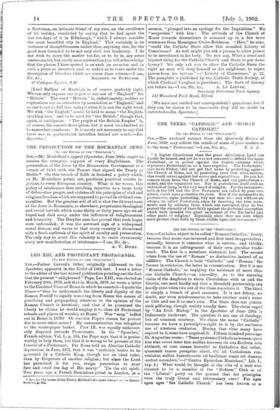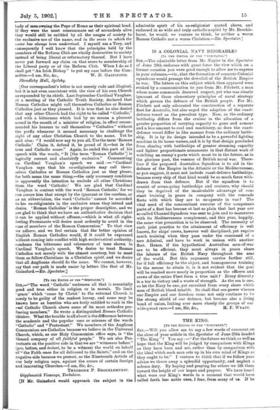(To THE EDITOR OF THE "SPECTITOR.1 Six,—Catholics object to be
called "Roman Catholics," firstly, because that name was invented and first used in opprobrium; secondly, because it connotes what is untrue ; and thirdly, because it is an infringement of their own peculiar trade- mark. The first is a notorious historical fact. The second arises from the use of " Roman " as distinctive, instead of as additive. The Church is both " Catholic " and "Roman," the former in extension, the latter in concentration. But it is not "Roman Catholic," as implying the existence of more than one Catholic Church,—an absurdity. As to the amusing claim of the Anglican to share Churchdom with us and the Greeks, one need hardly say that a threefold partnership can hardly exist when two out of the three repudiate it. The third is simply a breach of good manners. It is not felony, no doubt, nor even misdemeanour, to take another man's name or title and use it as one's own. The State does not punish such pilfering, though society usually does. The claim urged by "An Irish Bishop" in the Spectator of June 28th is ludicrously irrelevant. The question is not one of theology, but of common courtesy. We claim the name "Catholic" because we have a prescriptive right to it by the exclusive use of nineteen centuries. During that time many have aspired to it, none have acquired it. Fifteen hundred years ago St. Augustine wrote: "Tenet postremo Catholicae nomen, quod non sine causi inter tam multas haereses sic ista Ecclesia sola obtinuit, nt cum omnes haeretici se Catholicos dici velint, quaerenti tamen peregrino alicui, ubi ad Catholicam con- veniatur, milks haereticorum vel basilicam seam vel domum andeat ostendere."—(" Contra Epistolam Manichaei," Lib. I., cap. 4.) What would be thought of the wits of a man who claimed to be a member of the "Reform" Club or of the "Liberal" party on the ground that his principles were the truly liberal and reformatory ones? For ages upon ages "the Catholic Church" has been known as a
body of men owning the Pope of Rome as their spiritual head. If they were the most consummate set of scoundrels alive they would still be entitled by all the usages of society to the exclusive use of the name, and in the sense in which the name has always been understood. I myself am a Tory, and consequently I well know that the principles held by the members of the Reform Club are wholly destructive to society instead of being liberal or reformatory thereof. But I have never put forward my claim on that score to membership of the Liberal party or of the Reform Club. When I do so I shall get "An Irish Bishop" to put my ease before the Com- LOur correspondent's letter is not merely rude and illogical, but it is not even consistent with the view of his own Church as expounded by its chiefs. Last September Cardinal Vaughan, at a meeting of the Catholic Truth Society, declared that Roman Catholics might call themselves Catholics or Roman Catholics just as they pleased. It is true that he also denied that any other Church had the right to be called "Catholic," and with a bitterness which had by no means a pleasant sound in the mouth of a minister of religion, in effect recom- mended his hearers to call themselves " Catholics " without the prefix whenever it seemed necessary to challenge the right of any other Christian Church to the name. Yet he said also: "I would now say to you all, Use the term 'Roman Catholic.' Claim it, defend it, be proud of it,—but in the true and Catholic sense." Again, he ended this part of his speech with the words, "It [the term 'Roman Catholic'] is logically correct and absolutelY exclusive." Commenting on Cardinal Vaughan's speech we said : — "Cardinal Vaughan says that his co-religionists may call them- selves Catholics or Roman Catholics just as they please, for both mean the same thing,—the only necessary condition is apparently the intention to exclude all other Christians from the word Catholic.' We are glad that Cardinal Vaughan is content with the word Roman Catholic,' for we can assure him that except by the ignorant or the careless, or as an abbreviation, the word 'Catholic' cannot be accorded to his co-religionists in the exclusive sense they intend and desire. Roman Catholics' is the proper description, and we are glad to think that we have an authoritative decision that it can be applied without offence,—which is what all right. feeling Protestants will desire most ardently to avoid in the case of members of the Roman Communion." To that view we adhere, and we feel certain that the better opinion of English Roman Catholics would, if it could be expressed without coming into conflict with high ecclesiastical authority, condemn the bitterness and vehemence of tone shown in Cardinal Vaughan's speech. We desire to treat Roman Catholics not merely with the utmost courtesy, but to meet them as fellow-Christians in a Christian spirit, and we desire that all Anglicans should do the same. We cannot, however, say that our path is made easier by letters like that of Mr. Gainsford.—En. Spectator.]















































 Previous page
Previous page